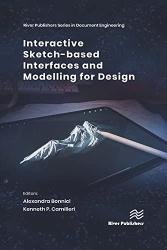Interactive Sketch-based Interfaces and Modelling for Design
- Добавил: literator
- Дата: 4-05-2023, 09:00
- Комментариев: 0
 Название: Interactive Sketch-based Interfaces and Modelling for Design
Название: Interactive Sketch-based Interfaces and Modelling for DesignАвтор: Alexandra Bonnici, Kenneth P. Camilleri
Издательство: River Publishers
Год: 2023
Страниц: 303
Язык: английский
Формат: pdf (true)
Размер: 20.3 MB
Sketching is a natural and intuitive communication tool used for expressing concepts and ideas that are difficult to communicate through text or speech alone. In design applications, drawings are used at various stages of the design process: from the early concept drawings scribbled on a piece of paper to immersive interactions in which users manipulate and adjust the 3D form of an object in virtual or augmented reality environments. This variety in drawing activities brings about the need for different interpretation strategies that support not only the sketching activity itself, but also allow sketch-based interactions, such as sketch-based queries, to take place. In this book, we explore the different drawing approaches used in design and the algorithms required for processing and interpreting the different sketches and drawings in design.
The book is divided into two parts. The first part focuses on sketching in the 2D domain. This includes the digitization of offline and paperbased sketches, techniques for online sketch recognition, observations of user drawing habits, algorithms for inferring depth from 2D drawings, as well as non-photorealistic rendering techniques that are then applied to sketch-based queries. The second part of the book focuses on 3D sketching in virtual or augmented reality spaces. Here, we present the processing and rendering of the 3D strokes, the different interaction devices available for 3D sketching, and look at different applications where immersive 3D sketching has been applied with success.
Computer systems can combine processing power with the nonrestrictive nature of sketches to allow designers to perceive and evaluate product properties under their multimodal and 3D forms. To achieve this potential requires combining efforts from several research areas including computer graphics, Machine Learning, augmented and virtual reality environments, tracking, and image/object retrieval, among others. An effective CAD system would be one that allows for a natural interface that does not distract the user from the design process. It should strike the right balance between creating a representation that allows for realistic rendering and incompleteness to allow for functional simulation while at the same time, leaving space for design thinking. The CAD system should support sketching using the designer-preferred drawing medium. This medium could be the traditional pen-and-paper, thereby requiring sketch interpretation systems, or the 3D space itself, requiring the ergonomic support necessary to sketch in space. Moreover, the CAD system should provide the tools necessary for unambiguous communication among multi-person collaborators, providing the means for assessing and re-directing the focus of attention of multiple users.
To allow the CNN to generalize to natural sketches and also to make use of the availability of uncoupled rough and neat sketches, Simo-Serra et al. extend this sketch simplification network to one which involves an adversarial augmentative framework based on the principles of generative adversarial networks (GANs).
Скачать Interactive Sketch-based Interfaces and Modelling for Design
[related-news] [/related-news]
Внимание
Уважаемый посетитель, Вы зашли на сайт как незарегистрированный пользователь.
Мы рекомендуем Вам зарегистрироваться либо войти на сайт под своим именем.
Уважаемый посетитель, Вы зашли на сайт как незарегистрированный пользователь.
Мы рекомендуем Вам зарегистрироваться либо войти на сайт под своим именем.
